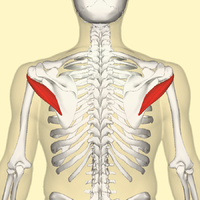
Photo from wikipedia
Objective. This paper assesses the effect of a passive shoulder exoskeleton prototype, Exo4Work, on muscle activity, muscle fatigue and subjective experience during simulated occupational overhead and non-overhead work. Methods. Twenty-two… Click to show full abstract
Objective. This paper assesses the effect of a passive shoulder exoskeleton prototype, Exo4Work, on muscle activity, muscle fatigue and subjective experience during simulated occupational overhead and non-overhead work. Methods. Twenty-two healthy males performed six simulated industrial tasks with and without Exo4Work exoskeleton in a randomized counterbalanced cross-over design. During these tasks electromyography, heart rate, metabolic cost, subjective parameters and performance parameters were acquired. The effect of the exoskeleton and the body side on these parameters was investigated. Results. Anterior deltoid activity and fatigue reduced up to 16% and 41%, respectively, during isometric overhead work, and minimized hindrance of the device during non-overhead tasks. Wearing the exoskeleton increased feelings of frustration and increased discomfort in the areas where the exoskeleton and the body interfaced. The assistive effect of the exoskeleton was less prominent during dynamic tasks. Conclusion. This exoskeleton may reduce muscle activity and delay development of muscle fatigue in an overhead working scenario. For dynamic applications, the exoskeleton's assistive profile, which mimics the gravitational torque of the arm, is potentially sub-optimal. Significance. This evaluation paper is the first to report reduced muscle fatigue and activity when working with an occupational shoulder exoskeleton providing one third of the gravitational torque of the arm during overhead work. These results stress the potential of occupational shoulder exoskeletons in overhead working situations and may direct towards longitudinal field experiments. Additionally, this experiment may stimulate future work to further investigate the effect of different assistive profiles.
Journal Title: IEEE Transactions on Biomedical Engineering
Year Published: 2022
Link to full text (if available)
Share on Social Media: Sign Up to like & get
recommendations!